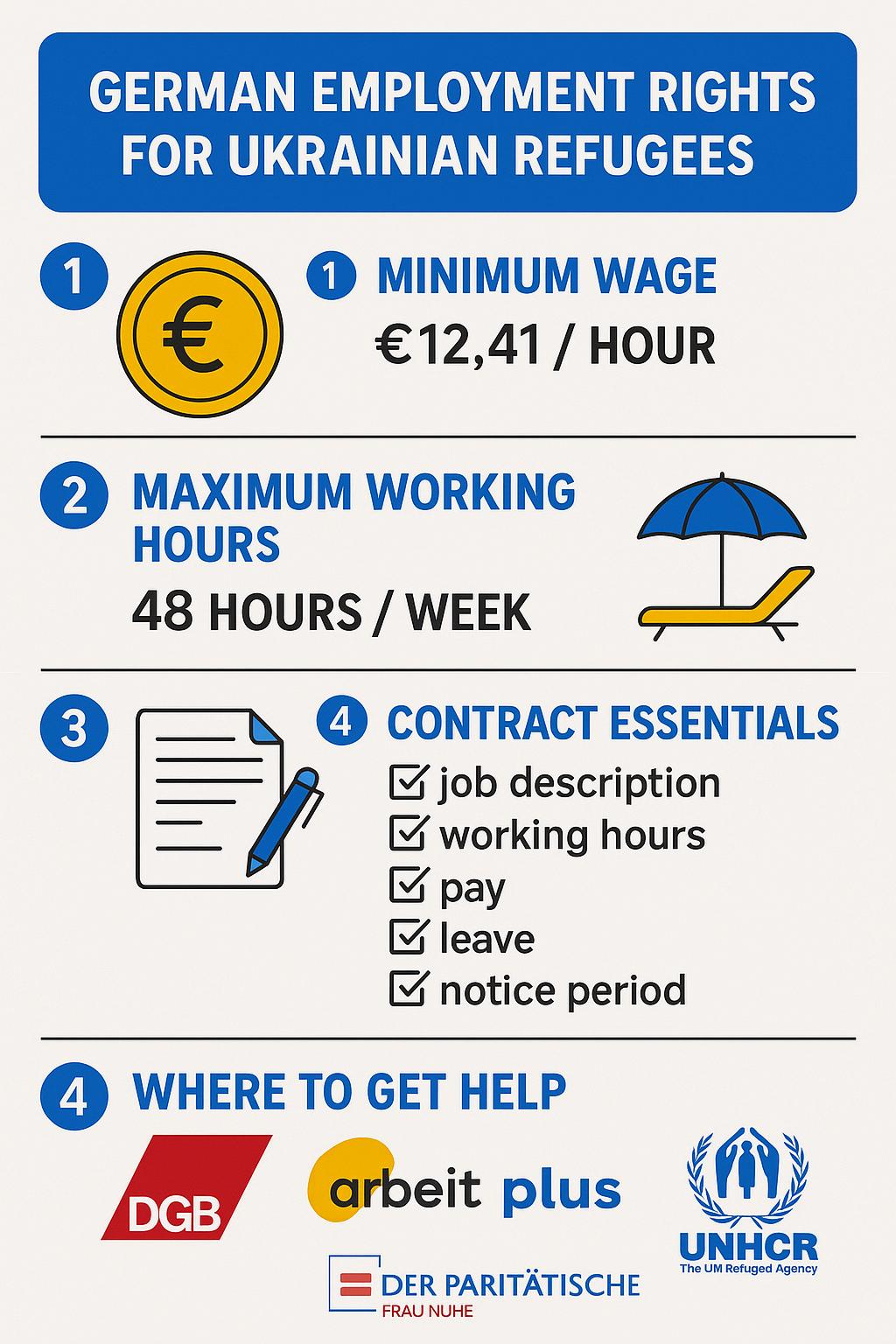Avoiding Legal Pitfalls and Workplace Exploitation
Ukrainian refugees often unknowingly sign problematic employment contracts due to language barriers and unfamiliarity with German labor law. This creates a serious problem: many end up in exploitative situations with below-minimum wages, unclear terms, or illegal clauses that German employers know they can get away with. This guide addresses this vulnerability by explaining your specific legal rights, identifying contract red flags, and providing concrete resources for free legal help. Without this knowledge, you risk years of underpaid work or legal disputes that could have been easily prevented.
Key Takeaways
- German employment law provides strong protections for all workers, including Ukrainian refugees under temporary protection status.
- All legal contracts must include specific elements like job description, working hours, salary, and notice periods.
- Watch for warning signs in contracts such as vague terms, missing information, or below-minimum wage offers.
- Free legal advice is available through refugee assistance organizations and workers’ unions across Germany.
- Many Ukrainians face challenges with qualification recognition and transitioning from temporary to permanent positions.
The Fundamentals of German Employment Contracts
German labor law (Arbeitsrecht) offers substantial protection to all employees regardless of nationality. This legal framework ensures fair treatment and establishes clear rights and responsibilities for both employers and employees.
Employment contracts in Germany come in two main types: permanent contracts (unbefristeter Arbeitsvertrag) and fixed-term contracts (befristeter Arbeitsvertrag). Permanent contracts have no end date and provide greater job security, while fixed-term contracts specify an end date and often serve as entry points for newcomers to the German job market.
All legal German employment contracts must contain certain essential elements to be valid. These include a detailed job description outlining your responsibilities, clearly stated working hours, specified salary amount and payment schedule, notice periods for termination, and a defined start date.
German employment is often governed by collective bargaining agreements (Tarifverträge) that set industry-specific standards. These agreements frequently offer better conditions than the legal minimum requirements and can significantly impact your working conditions and benefits.
It’s important to note that German law requires employment contracts to be provided in written form within one month of starting work. While verbal agreements are legally binding, having written documentation is crucial for protecting your rights and avoiding misunderstandings.

Your Rights as a Ukrainian Refugee in the German Workforce
Ukrainian refugees in Germany benefit from the EU Temporary Protection Directive, which grants immediate work authorization without the lengthy asylum process. This status gives you the legal right to seek employment and receive equal treatment under German labor laws.
German law strictly prohibits discrimination based on nationality, ensuring equal treatment in the workplace. Your rights include proper working conditions, fair wages, and protection against unfair dismissal regardless of your refugee status.
All employees in Germany, including refugees, are entitled to the national minimum wage (€12.41/hour as of 2023). Additionally, German law limits working time to a maximum of 48 hours per week with mandatory rest periods between shifts.
Holiday entitlement in Germany starts at a minimum of 20 working days per year for a five-day work week. You also have rights to sick pay, with employers required to continue paying your salary for up to six weeks during illness, after which health insurance benefits take over.
Working in Germany means you’ll be enrolled in the social security system, which includes health insurance, pension insurance, unemployment insurance, and long-term care insurance. These contributions are automatically deducted from your salary but provide valuable social protection during your stay in Germany.
Red Flags: Identifying Problematic Contract Terms
Be wary of employers who only offer verbal contracts or present documents with vague job descriptions. A proper German employment contract should clearly define your role, responsibilities, and working location.
Watch out for provisions that limit your ability to change employers or require excessive notice periods beyond what’s legally standard. German law typically sets notice periods at four weeks to the 15th or end of a month for regular employees, with longer periods possible based on tenure.
Any salary offer below the legal minimum wage or contracts with unclear payment terms should raise immediate concerns. Similarly, be cautious about missing information regarding working hours or contracts that expect excessive overtime without proper compensation.
German employment law prohibits certain clauses, such as provisions for immediate termination without valid cause or terms that would forfeit your right to final wages. These illegal clauses are unenforceable but signal an employer who may not respect your rights.
Beware of probation periods exceeding six months or excessive non-compete clauses that would restrict your future employment options. These terms often go beyond what’s legally permissible and may be designed to take advantage of your unfamiliarity with German employment practices.

Where to Get Help with Contract Review
Several refugee assistance organizations offer free legal advice services specifically for employment matters. Organizations like Flüchtlingsrat, Caritas, and Diakonie have specialized advisors who can review your contract and explain German employment standards.
Workers’ unions such as IG Metall and ver.di provide contract review services even to non-members in many cases. These unions have extensive experience with employment rights and can identify problematic terms that might otherwise go unnoticed.
Government advisory services through your local Jobcenter and the Federal Employment Agency (Bundesagentur für Arbeit) can provide guidance on employment contracts. These official agencies offer reliable information about your rights and can direct you to specialized services when needed.
Community-based Ukrainian support groups have developed throughout Germany since 2022, often offering peer support and translation assistance. These groups frequently maintain lists of Ukrainian-speaking lawyers or volunteers with employment law knowledge.
Several digital platforms now provide resources in Ukrainian language to help understand German employment contracts. These include translation tools, contract templates, and explanatory guides about German labor law specifically designed for Ukrainian refugees.
If you’re also dealing with housing issues, you might want to learn about applying for a housing entitlement certificate (Wohnberechtigungsschein) which can help secure affordable housing while you establish yourself in the German workforce.
Common Pitfalls After Two Years: Learning from Experience
Many Ukrainian refugees find themselves accepting repeated short-term contracts rather than advocating for permanent positions. After two years in Germany, it’s worth reviewing your contract situation and discussing conversion options with your employer, as German law limits the use of consecutive fixed-term contracts.
The German social insurance and tax system often causes confusion among newcomers. Understanding the difference between gross and net salary is crucial, as deductions can account for 30–40% of your gross pay depending on your tax class and other factors.
Many refugees overlook career advancement opportunities and their rights to further qualification. German employers often provide training options, and various government programs support professional development for refugees specifically.
Joining professional associations or workers’ councils (Betriebsrat) can significantly improve your working conditions. These organizations represent employee interests and can help address workplace issues that might otherwise go unresolved.
Documentation is essential when experiencing workplace problems in Germany. Many Ukrainian workers fail to properly document issues or understand formal complaint procedures, making it difficult to address problems later.
Cultural differences between Ukrainian and German workplace expectations can lead to misunderstandings. Germans often value direct communication, strict adherence to procedures, and clear separation between work and personal life. Recognizing these cultural nuances can improve workplace integration and prevent contract disputes.
Seeking Professional Translation Services
For complex employment contracts, professional translation services can be invaluable. Many cities now have Ukrainian-German translators who specialize in legal documents and can provide certified translations when needed.
Community colleges (Volkshochschulen) frequently offer affordable translation services through their language departments. These services may have waiting periods but are typically more budget-friendly than commercial translation agencies.
Digital translation tools have improved significantly but should be used with caution for legal documents. They can help with initial understanding, but critical terms should be verified by a human translator who understands legal terminology.
Some employers are willing to provide translation services for employment contracts, particularly larger companies with international experience. Don’t hesitate to ask your potential employer if such assistance is available before signing any documents.
University legal clinics in major German cities sometimes offer free translation and contract review services to refugees. These clinics are staffed by law students supervised by professors and can provide both translation and basic legal guidance.
Understanding Your Qualification Recognition Options
Many Ukrainian professionals work below their qualification level due to recognition challenges. Germany has specific procedures for recognizing foreign credentials through the Recognition Act (Anerkennungsgesetz), which can help you access appropriate employment.
The “Recognition in Germany” portal provides detailed information in Ukrainian about the recognition process for various professions. Understanding this process early can prevent years of underemployment and help secure contracts that match your skills.
Bridging programs exist for many regulated professions like medicine, engineering, and teaching. These programs help fill qualification gaps and lead to full recognition of Ukrainian credentials, opening doors to better employment contracts.
Language certification is often required alongside professional recognition. Investing in German language courses specifically for your professional field can significantly improve your contract negotiation position and career prospects.
Financial assistance for qualification recognition is available through various programs. The cost of recognition procedures, necessary additional training, and even living expenses during qualification processes may be covered by government support programs specifically designed for refugees.
Sources
Make it in Germany: Employment Contract
Handbook Germany: Employment Contract
EU Equal Treatment Office: Working in Germany
Federal Ministry of Labour and Social Affairs: Labour Law
Minor Kontor: Ukrainian Refugees in Germany Employment
Federal Ministry of Justice: Vocational Training Act

